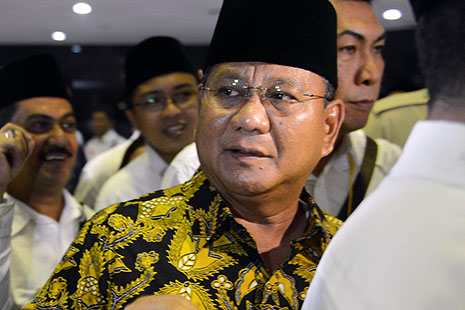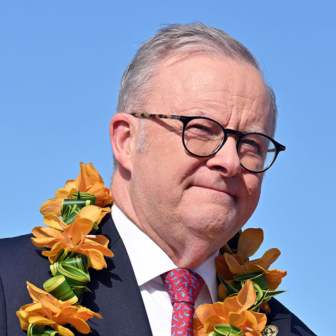Indonesia’s presidential election is being fought hard, except in one crucial realm: that of ideas. The frontrunner is Prabowo Subianto, a former military man with a bad human rights record, whose program and public pronouncements contain many hints – and more than hints – that he wants to take country back toward at least a semi-authoritarian form of rule. The campaign of his rival, Joko Widodo, the governor of Jakarta, has run light on virtually everything except the attractive personality of its candidate. In particular, Jokowi and his supporters have scrupulously sought to avoid anything that might leave them open to accusations of running a “black campaign” against Prabowo. As a result, what Prabowo wants to do with the political system if he is elected, and the threat he represents of authoritarian regression, hasn’t been made clear to voters.
This has begun to change over the last few days, with some public discussion of Prabowo’s plans for reforming Indonesia’s political system getting under way. While this discussion has still not gone mainstream, it constitutes one of the first serious attempts to question Prabowo about what exactly he wants to do with the presidency if he is victorious on 9 July. In particular, attention has focused on Prabowo’s vaguely stated – but increasingly clear – desire to get rid of direct presidential elections should he win, and thus avoid having to face another popular vote.
On 28 June at the Taman Ismail Marzuki cultural centre in Jakarta, Prabowo said that he viewed Indonesia’s political system as being unduly influenced by Western values. For him, direct elections (presumably both at the national and local level) were not in line with Indonesian culture, but had been adopted and perpetuated like a bad habit (he mentioned smoking as an example). What was needed, he continued, was a new consensus among Indonesia’s key social and political groups. He left open what this new political consensus should or could look like, but given his trenchant criticism of direct elections, it is fair to assume that Prabowo would try to work towards an alternative system in which top executive leaders are indirectly rather than popularly elected.
Back to the 1945 constitution
In fact, Prabowo has in rudimentary form laid out his plans for a radical restructuring of the political landscape many months ago. In the Manifesto Perjuangan Partai Gerindra, or Struggle Manifesto of the Gerindra Party, Prabowo’s party alleged that the amended constitution that been in place since 2002 has been a failure. As a consequence of that failure, Gerindra proposed to return to the original constitution “as declared on 18 August 1945.” This very brief constitution, written hurriedly in the weeks prior to the declaration of independence, is an autocrat’s dream: it leaves fundamental issues unregulated, allowing presidents to tailor the political system to their tastes and preferences, and served both Sukarno and Suharto well in creating their respective authoritarian regimes between 1959 and 1998. As the 1945 constitution doesn’t even require parliament to be elected, for instance, Sukarno appointed his own in 1960.
Most importantly, however, the 1945 constitution stipulates that the president is not directly elected by the people but by the MPR (People’s Consultative Assembly). In turn, the exact composition of the MPR is left unregulated – a loophole that allowed Suharto to appoint most of the delegates himself. The president was elected for the last time by the MPR in 1999, after which fresh constitutional amendments led to the first direct presidential polls in 2004.
Against this background, Prabowo’s attack on direct elections at Taman Ismail Marzuki should not (and cannot) be read as a harmless off-the-cuff statement in response to a non-political question, as his supporters later claimed. Nor was he taken out of context, as Prabowo himself complained. His words were simply an explicit statement of what is already implicit in Gerindra’s demand for a return to the original 1945 constitution: annulling all post-1998 amendments would automatically revoke direct elections and return presidential “elections” to the MPR.
Prabowo’s clarification
On 30 June, ANU academic Ross Tapsell had the chance to ask Prabowo directly about his intentions. At an event largely attended by foreign diplomats and held entirely in English, Tapsell asked Prabowo to respond to the Taman Ismail Marzuki controversy and his views on democracy more broadly. Prabowo’s answer gives us greater insight into his thinking and should lead to more, not less, concern about what he has in mind for Indonesia after 9 July.
In what has now become Prabowo’s standard approach to such questions, he expressed dismay at the media for portraying him as non-democratic, and generally described himself as “a democrat.” Judging from the loud applause greeting his protestations, and given that even hard-nosed foreign journalists found him “believable,” his strategy seem to have worked. Many foreign diplomats, it seems, leaned back in their seats and breathed a sigh of – misplaced – relief.
Far from denying that he wanted to get rid of direct elections, he delivered more justifications for this idea. At Taman Ismail Marzuki he had focused on how direct elections violated the values of “our ancestors”; in front of his foreign audience, he attacked these elections as being too expensive and as breeding corruption. “Our version of democracy is very expensive,” he said, and he proposed to search for ways “to carry out democracy that is consistent with our economic means.” This has been the argument advanced by bureaucrats in the Ministry of Home Affairs, who have called for the return of local executive elections to the legislature for many years. Clearly, Prabowo is tapping into a widespread sentiment about high-costs elections to prepare the ground for a major revamp of the electoral system.
And while the examples Prabowo mentioned related mostly to local polls, it is hard to escape the conclusion that he was talking about the national level as well. Interestingly, he avoided explicitly providing a guarantee that he would face the voters again in five years time in order to be held accountable by the electorate. Instead, he said, in an uncharacteristically garbled sentence, “If I become elected I get elected by direction [sic] elections, that I agree, that I accept.” This was followed by references to the demand for a “new consensus,” repeating the Taman Ismail Marzuki speech when he had taken a strong stance against direct elections.
In contrast to that speech, however, Prabowo indicated that he had already raised the issue with his coalition partners – further undermining suggestions that the remarks were off the cuff and didn’t represent deep thinking or concrete plans. According to Prabowo, “I told our friends in the Coalition, the Indonesian leaders must gather together and look for a new consensus, how to devise a system that is still democratic, that still represents the will of the people, but that is affordable.” The conclusion seems inescapable: Prabowo is intent on building a low-cost political system that fulfills the minimum requirements of democracy but that avoids direct elections.
Modeled on Westminster?
Prabowo’s rhetoric evokes memories of Suharto’s Pancasila Democracy – a system that upheld elections as a source of legitimacy but reduced them to a five-yearly, predictable ritual. But in his quest to restore the political framework that was practiced under the original 1945 constitution, Prabowo also made references to the Westminster systems of Western Europe: “He who wins the legislative election, will, you can get majority rule in parliament, you are automatically chief of the executive. In our opinion it could be cheaper.” This statement removes all doubt that Prabowo is thinking about abolishing direct elections not only at the regional level, as some supporters have suggested, but also for the presidency. Indeed, what Prabowo says here is, in theory at least, exactly what the original 1945 constitution envisaged – a party that wins a parliamentary election can have its candidate elected as president by the MPR. Suharto was re-elected six times in this way.
However, it would be naive to interpret Prabowo’s sudden reference to the Westminster system as an invitation to society to discuss Indonesia’s possible shift to a parliamentary system. Nothing in Prabowo’s previous statements, speeches or published platforms suggest that he has any sympathy for parliamentary democracy. Instead, Gerindra’s manifesto has called for the reestablishment of a “pure presidential system,” which it claims has been watered down by the post-1998 constitutional amendments. Prabowo’s speeches during the campaign have also focused on the need to restore presidential authority and provide “decisive leadership.”
The idea of introducing a Westminster democracy, in which prime ministers depend on having a majority in their unruly party rooms, could therefore not be further from what Prabowo has publicly announced as his main political goal – a strong, centralised presidential system. The only element of Westminster democracy that interests him, it appears, is the element of indirect election of the chief executive by the legislature. Prabowo himself strongly hinted at this in his 30 June remarks, in which he claimed that “our original [1945] constitution actually is more in line with Westminster parliamentary democracy.” The similarities are limited to a single aspect: the absence of popular ballots for top government leaders.
Implications of change
There can thus be little doubt that Prabowo wants to abolish direct elections for the presidency, as well as at the regional level. Does it matter? After all, as Prabowo says, some countries elect their heads of government indirectly through parliament. Doesn’t Prabowo’s proposal suggest simply a reformulation of Indonesian democracy rather than a diminution of it?
There are reasons to be pessimistic on this score. The history of the Suharto regime itself is an obvious reminder of how readily elections by the MPR can be manipulated, especially in the context of a constitution that places almost no constraints on the executive. The first years of Indonesia’s reformasi period, when local government heads were elected by local parliaments, also show us that indirect elections are more open to manipulation and graft than direct elections. In many districts and provinces, candidates for local government who would have been unable to win public office through a popular vote came to power simply by paying the biggest bribes to the members of their local parliament. Direct elections, though undoubtedly costly for candidates, have generally produced much better outcomes.
We can expect the same at the national level. A powerful and determined president will find it much easier to manipulate the few hundred MPR members to secure re-election than to manipulate the entire population in an open poll. He would be able to use any number of measures to entice or bully MPR members to support his re-election: co-opting party leaders by offering them ministerial posts or other deals, buying off parties by providing them with patronage resources, bribing individual MPs with corrupt payments, threatening opponents with prosecution for corruption or other misdemeanours, and so on.
In short, indirect elections through the MPR offer a far more promising path to permanent entrenchment in power. And in that context it is worth remembering one other provision that will be lost should Indonesia return to the original 1945 Constitution: the article limiting presidents to a maximum of two terms in office. •




